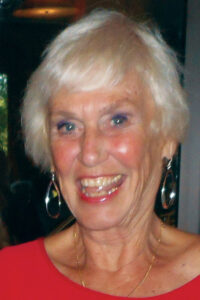Overcoming childhood trauma is work. It means rolling up your sleeves and gathering your resources
By Barbara Pierce
 “On a cold day in the park, I met a small girl who changed my life. Eight years old, wearing a drab, ragged dress with ugly brown shoes. I held out a cookie to her as she sat in the swing. She took a nibble, looked at me for the first time and smiled, a smile that lit up her dirty face. Arranged by her social worker, our meeting was not a coincidence.
“On a cold day in the park, I met a small girl who changed my life. Eight years old, wearing a drab, ragged dress with ugly brown shoes. I held out a cookie to her as she sat in the swing. She took a nibble, looked at me for the first time and smiled, a smile that lit up her dirty face. Arranged by her social worker, our meeting was not a coincidence.
“I badly wanted a child; she badly needed someone to love her. We’ve been mother and daughter for 30 years; I’ll never forget that day!”
I wrote this years ago in response to a writing challenge that asked me to sum up a life-changing event in 100 words.
The little girl I adopted had a tragic life that no child should suffer. Though all her belongings were in one shopping bag, she came overloaded with emotional baggage.
If you were to meet confident, attractive 48-year-old Vicky today, you’d never suspect the trauma she went through as a child. But she was severely traumatized by the emotional, physical and sexual abuse she suffered. My heart breaks when I think of all that raggedy little girl had endured.
I’d like to help you understand how she healed, how she got from that victimized child to the successful, contented adult she is today.
I learned much from her.
Also, I learned as a counselor in an organization that helped people coming out of an abusive situation; I learned considerably from the brave women and men who came through our doors.
Childhood is a sensitive period in our life. Never underestimate the power our past has on our present; it’s the foundation on which we build our adult life. Suffering trauma as a child has significant effects on adulthood. It affects our mental, physical and emotional health in critical ways — such as depression, anxiety, addiction, unhealthy relationships or avoiding relationships.
In the end, trauma is like a wound that hasn’t healed properly. It takes time, care, attention and thoughtfulness. No matter what life events you might’ve experienced, healing is possible. The process looks different for everyone.
The first step is understanding and acknowledging the trauma we’ve experienced. To understand who we are is to explore who we were; the events or unmet needs that have made us the person we are today.
It can be overwhelming to think of all the ways you’ve coped. But this recognition, though painful, is the first step to making positive changes.
It’s essential to have at least one other person with whom you can share your pain and your healing. Another survivor, a nurturing, trusted partner, friend or family member or counselor. A skilled therapist can be extremely helpful.
My daughter had several years of counseling once she left the abusive family; it was a significant help.
I realized she had made significant steps forward one night when she asked me “Do think I could change my name?” (Her name on the adoption certificate was Rebecca.)
“Rebecca’s not a good name,” she explained. “Nobody likes Rebecca. Rebecca screws everything up.”
“And it’s not the name my birth mother gave me,” she continued. ‘I want to go back to the name my birth mother gave me, Victoria. People like Victoria.”
She changed her name and changed her behavior.
She began to see herself as a survivor rather than a victim. One must be strong to survive what she survived.
Accepting is the next step. Accepting the reality of what you went through is particularly difficult, as you might experience guilt for putting down your parent(s) or the situation in which you were raised. However, you can accept both the good and bad experiences. You can be honest about the happy parts of your childhood alongside the wounding aspects, events or individuals.
Accepting doesn’t mean forgiving. Well-meaning people may advise this. But some things are unforgivable. Ultimately, the only person you must forgive is yourself. The key here is to stop and think: you are not responsible for what happened. You were just a child. Your childhood trauma has left a scar. Like all wounds, it’s important to take the time to heal correctly. Be patient and loving with yourself. Treat yourself like you would a best friend.
Overcoming childhood trauma is work. It means rolling up your sleeves and gathering your resources, including personal support, professional services and additional financial or health insurance information. You must be willing to ask for help, remain open to learning new skills, own your shortcomings and endure temporary discomfort.
Healing is possible. It is possible for you.
 Barbara Pierce is a retired licensed clinical social worker with many years of experience helping people. If you would like to purchase a copy of her book, “When You Come to the Edge: Aging” or if you have questions for her, contact her at barbarapierce06@yahoo.com.
Barbara Pierce is a retired licensed clinical social worker with many years of experience helping people. If you would like to purchase a copy of her book, “When You Come to the Edge: Aging” or if you have questions for her, contact her at barbarapierce06@yahoo.com.
